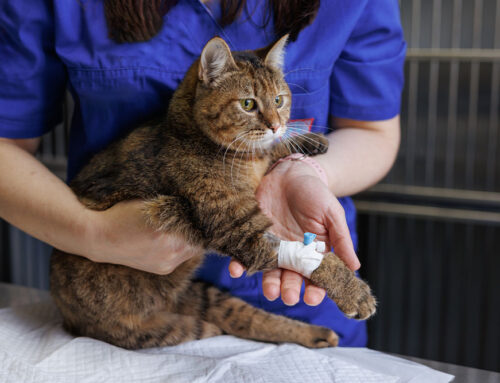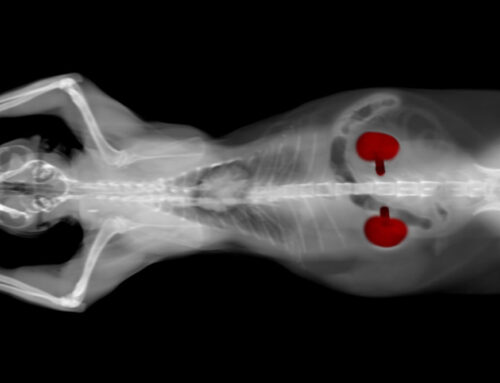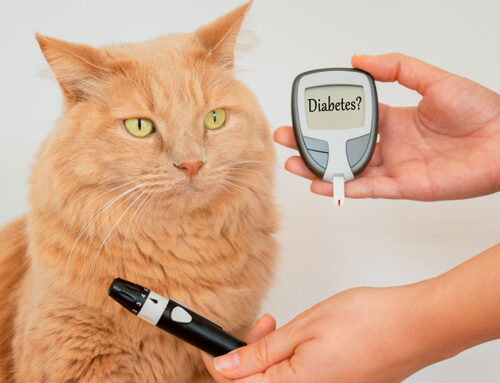As pet owners, we all want the best for our furry companions, especially when it comes to their diet and nutrition. However, so much conflicting information is available that separating fact from fiction can be challenging. Our Greenfield Veterinary Clinic team debunks some of the most common pet nutrition myths and tells you the truth behind these misconceptions.
Myth: Dogs should eat only meat
Truth: As descendants of wolves, dogs are thought to be strict carnivores. However, wild canines are generally opportunistic omnivores. Wolves subsist on a diet that is mostly meat-based, but they do eat vegetation when prey is scarce. Over centuries of domestication, dogs’ digestive abilities have evolved to derive nutrients from a variety of foods, including vegetables and grains. A well-balanced diet for dogs includes a mix of protein, fats, carbohydrates, vitamins, and minerals. High-quality commercial dog foods are formulated to meet these nutritional needs.
Myth: Cats can live on dog food
Truth: Cats and dogs have different nutritional requirements. Cats are obligate carnivores, meaning they require certain nutrients found only in animal tissues. One crucial nutrient is taurine, which dog food does not contain in sufficient amounts. Feeding cats a diet designed for dogs can lead to severe nutritional deficiencies and health issues.
Myth: Grain-free diets are healthier for pets
Truth: Grain-free diets have gained in popularity, because of concerns about allergies and sensitivities, but they are not necessarily healthier for pets. In fact, the FDA has investigated potential links between grain-free diets and a type of heart disease called dilated cardiomyopathy (DCM) in dogs. Grains are a valuable source of carbohydrates, fiber, and essential nutrients. Food allergies in pets are rare, and only a small percentage of allergic pets have true grain allergies.
Myth: Table scraps are safe for pets
Truth: Feeding pets table scraps can lead to several problems, since many human foods are high in fat, sugar, and salt, which are not suitable for pets. Some foods, including chocolate, onions, grapes, and certain artificial sweeteners (e.g., xylitol), are toxic to dogs and cats. Stick to pet-specific treats and diets to ensure your pet’s safety and health.
Myth: Dry food is better for dental health
Truth: While dry food’s abrasive texture can help reduce plaque buildup, the food is not a total solution for dental health. Regular dental care, including brushing your pet’s teeth and professional cleanings, is essential for maintaining oral health.
Myth: Pets self-regulate their food intake
Truth: Pets do not always self-regulate and free feeding can lead to overeating and obesity, which are major health concerns. Follow portion recommendations and establish a feeding schedule to maintain a healthy weight for your pet.
Myth: Raw diets are the best choice for pets
Truth: Raw diets have their proponents, but they also come with risks. Raw diets can become contaminated with bacteria, such as salmonella and E. coli, which can harm pets and their owners. Additionally, preparing a nutritionally balanced raw diet can be challenging. Consult with our Greenfield Veterinary Clinic veterinarian before considering a raw diet for your pet.
Myth: Homemade diets are healthier than commercial pet food

Truth: While homemade diets allow pet owners to control the ingredients in their pet’s food, they can be difficult to balance nutritionally. Commercial pet foods are formulated to meet pets’ dietary needs and are regulated to ensure they provide essential nutrients. If you choose to prepare homemade meals for your pet, you must first work with a veterinary nutritionist to ensure the diet is complete and balanced.
Navigating pet nutrition can be challenging, but understanding the facts versus the myths can help you make informed decisions about your pet’s health. By providing a balanced and appropriate diet, you can ensure your furry friend stays healthy and happy.
For personalized nutritional advice, reach out to our Greenfield Veterinary Clinic team. We can offer tailored recommendations based on your pet’s specific needs and health conditions.







Leave A Comment